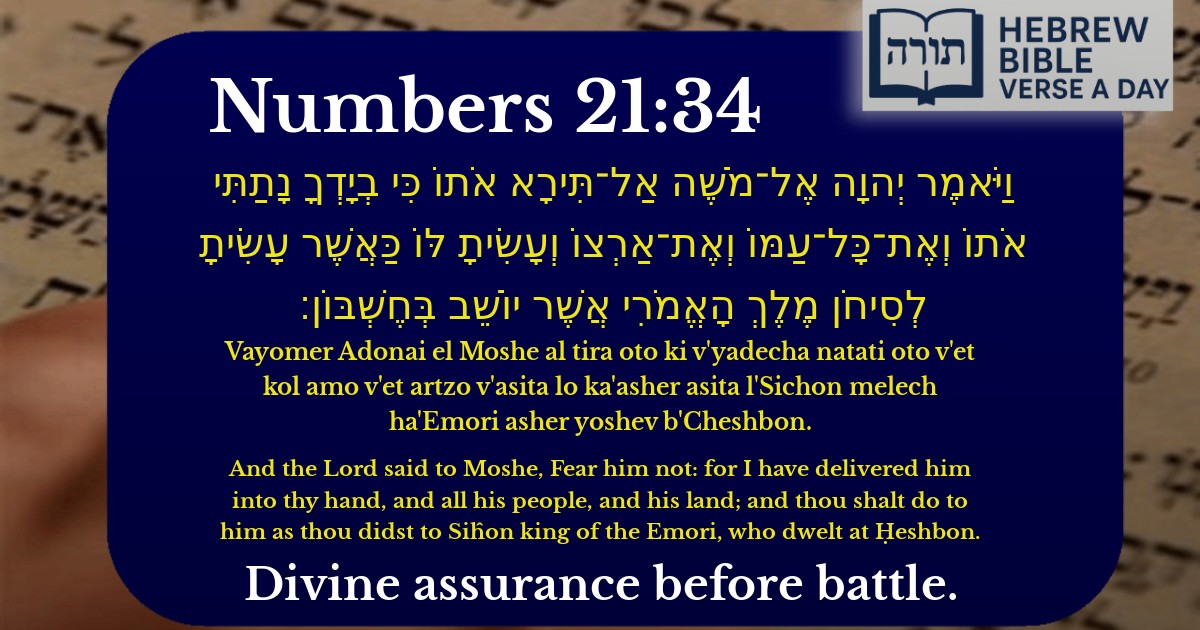Join Our Newsletter To Be Informed When New Videos Are Posted
Join the thousands of fellow Studends who rely on our videos to learn how to read the bible in Hebrew for free!
Hebrew Text
וַיֹּאמֶר יְהוָה אֶל־מֹשֶׁה אַל־תִּירָא אֹתוֹ כִּי בְיָדְךָ נָתַתִּי אֹתוֹ וְאֶת־כָּל־עַמּוֹ וְאֶת־אַרְצוֹ וְעָשִׂיתָ לּוֹ כַּאֲשֶׁר עָשִׂיתָ לְסִיחֹן מֶלֶךְ הָאֱמֹרִי אֲשֶׁר יוֹשֵׁב בְּחֶשְׁבּוֹן׃
English Translation
And the Lord said to Moshe, Fear him not: for I have delivered him into thy hand, and all his people, and his land; and thou shalt do to him as thou didst to Siĥon king of the Emori, who dwelt at Ḥeshbon.
Transliteration
Vayomer Adonai el Moshe al tira oto ki v'yadecha natati oto v'et kol amo v'et artzo v'asita lo ka'asher asita l'Sichon melech ha'Emori asher yoshev b'Cheshbon.
Hebrew Leining Text
וַיֹּ֨אמֶר יְהֹוָ֤ה אֶל־מֹשֶׁה֙ אַל־תִּירָ֣א אֹת֔וֹ כִּ֣י בְיָדְךָ֞ נָתַ֧תִּי אֹת֛וֹ וְאֶת־כׇּל־עַמּ֖וֹ וְאֶת־אַרְצ֑וֹ וְעָשִׂ֣יתָ לּ֔וֹ כַּאֲשֶׁ֣ר עָשִׂ֗יתָ לְסִיחֹן֙ מֶ֣לֶךְ הָֽאֱמֹרִ֔י אֲשֶׁ֥ר יוֹשֵׁ֖ב בְּחֶשְׁבּֽוֹן׃
וַיֹּ֨אמֶר יְהֹוָ֤ה אֶל־מֹשֶׁה֙ אַל־תִּירָ֣א אֹת֔וֹ כִּ֣י בְיָדְךָ֞ נָתַ֧תִּי אֹת֛וֹ וְאֶת־כׇּל־עַמּ֖וֹ וְאֶת־אַרְצ֑וֹ וְעָשִׂ֣יתָ לּ֔וֹ כַּאֲשֶׁ֣ר עָשִׂ֗יתָ לְסִיחֹן֙ מֶ֣לֶךְ הָֽאֱמֹרִ֔י אֲשֶׁ֥ר יוֹשֵׁ֖ב בְּחֶשְׁבּֽוֹן׃
🎵 Listen to leining
Parasha Commentary
📚 Talmud Citations
This verse is quoted in the Talmud.
📖 Sotah 43a
The verse is referenced in the context of discussing the conquests of the Land of Israel and the divine assurance given to Moses regarding the defeat of kings.
📖 Berakhot 54b
The verse is mentioned in a discussion about the miracles performed for Israel and the gratitude owed to God for His deliverance.


Context of the Verse
This verse (Bamidbar 21:34) appears during the Israelites' journey in the wilderness, when they faced Og, king of Bashan. Hashem reassures Moshe not to fear Og, promising victory just as He granted against Sichon, king of the Emori. The encounter with Og occurs after the defeat of Sichon, demonstrating Hashem's continued protection and fulfillment of His promise to bring Bnei Yisrael into Eretz Yisrael.
Rashi's Explanation
Rashi (Bamidbar 21:34) explains that Moshe feared Og because of a tradition (Midrash) that Og was the last survivor of the Refaim (giants) and had once helped Avraham by informing him of Lot's capture (Bereishit 14:13). Moshe worried that Og's past merit might protect him. However, Hashem assures Moshe that Og’s merits were insufficient, and he would be delivered into Bnei Yisrael’s hands.
The Rambam's Perspective
The Rambam (Hilchot Melachim 5:1) discusses the laws of war and highlights that Moshe’s hesitation was rooted in the principle of avoiding unnecessary conflict. However, once Hashem commanded the battle, Moshe acted with full confidence in divine assistance. This teaches that even a leader as great as Moshe must rely on Hashem’s guidance in matters of war.
Midrashic Insights
Spiritual Lessons
The verse teaches that fear of enemies—no matter how formidable—must be overcome through trust in Hashem. Just as Hashem delivered Sichon and Og into Moshe’s hands, He continues to protect Klal Yisrael when they rely on Him. Additionally, it emphasizes that past merits (like Og’s assistance to Avraham) do not grant indefinite protection if one later opposes Hashem’s will.